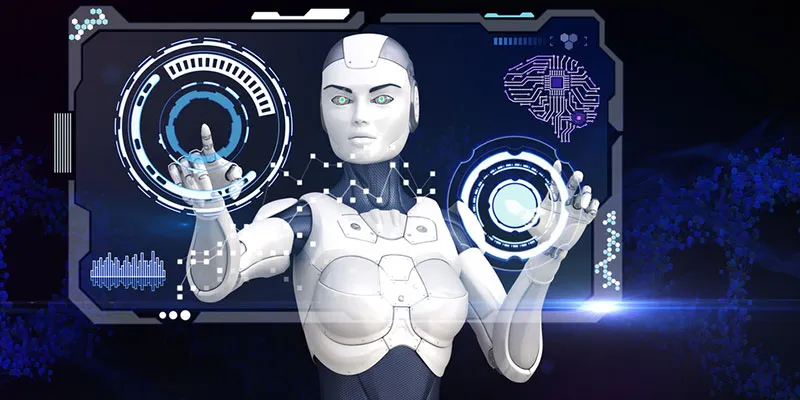How artificial intelligence is impacting the service industry
Every single day, millions of dollars are being spent in call centres simply to answer repeated questions, thousands of times over and over again. Let us see how AI is going to affect IT service management.
In this age of artificial intelligence, managers at all levels need to accept that a significant chunk of their jobs might be done better and more efficiently by machines. Researchers conducted surveys and found that managers at all levels spend bulk of their time in administrative tasks, such as making schedules or writing reports. These are the very tasks that are most likely to be automated in the near future. In fact, some companies have already made improvements by transitioning these tasks to AI.

It was found that managers need to have the skill of judgement to succeed at work in this age of automation, which includes thinking creatively, data analysis, data interpretation, and developing strategy. Other skills that stood out as most important are social networking, coaching, and collaboration. These are the skills which will help managers stand out when AI take over the administrative tasks that managers perform today. Machines would never completely replace managers but they would give managers more time. So, the real priority for managers should be refocussing on the tasks that only humans can do using their creativity, collaborating attitude, empathising nature, and the power of judgement.
Machine v/s human
AI is very good at eliminating human error. Humans, many a times tend to deviate from standard defined processes which results in fatalities. Examples could be in various areas — a critical patient operated upon by a team of doctors may die because of a minor human error or pilots who have to take care of thousands of computations while the plane is flying, may cause the plane to crash. In such situations, a trained intelligent bot can take decisions which are as close to defined standards.
Let us try to understand why automation is being considered a threat to future jobs. It began with basic automation, wherein a particular manual task was programmed to be done by machine.The task when done by machine was completed faster and without any human error of course. This led to more automation of such menial tasks which resulted in improved efficiency; hence, the productivity of the entire organisation grew multi-fold.
Now with the evolution of technologies like artificial intelligence, machine learning and deep learning, machines can actually learn on their own and be taught to do more complicated tasks which are currently being done by humans.
IT Customer Support is one such domain wherein we can have intelligence bots well-trained with large sample datasets, who know how to respond to every kind of customer query or ticket. These bots are intuitive enough to adapt and improve themselves without human intervention. They become better with time.
Understanding IT service management (ITSM)
IT Service Management, also called ITSM, is the term used to refer to the implementation, managing and delivering of quality IT services in the best possible way to meet the needs of a business.
It ensures an appropriate mix of people, processes and technology are in place to provide value to a business. Essentially, ITSM is about value- it is about taking your resources, your capabilities and making something valuable for your business.

According to reports, global outsourced customer services market is projected to reach $84.7 billion by 2020. Another study, revealed that companies lose more than $62 billion due to poor customer service. Obviously, no company can afford to provide a not so good customer support.
Why AI is required in customer service

Every single day, millions of dollars are being spent in call centres simply to answer repeated questions, thousands of times over and over again. In other words, providing customer support is really an expensive task. A study on customer support market found the following:
- Around 270 billion phone calls were made annually to call centres which cost around $600 billion.
- One out of two incoming calls require escalation or go unresolved.
- 61 percent of all calls could have been resolved with better access to information.
Entities involved in customer service
A customer support service has various entities involved and let us understand how AI is going to affect each one of them:
- Agent: AI is going to recommend solutions, recommend classifications, help agent understand what the issue is, thereby making the agent smarter and provide the best reply to customer.
- Customer: AI can deflect cases by answering questions such as what can be done on the website to help customers find the better solution. It can suggest how we can push the solution faster to the customer. AI clubbed together with chatbots helps in responding to customers queries faster and more accurately based on data analysis in real time.
- Operations: With AI one can predict the close time of a customer issue, one can actually allocate the case to someone knowledgeable in that specific topic.
What AI has brought to customer service business
Following are some of the areas where artificial intelligence has proved to be very efficient: :
- Increased customer satisfaction
- Customer attrition reduction
- Customer effort reduction
- Higher customer service satisfaction level by agent
- Reduced agent on-boarding time
- Reduced cost per ticket
- Improved business outcome
- Reduced costs of service operations
- Increased revenue
Companies improving customer service by using artificial intelligence
Let us take a look at a few startups working in automating the customer service process at various levels:
- Neva.ai: Automates customer service and support using artificial intelligence and natural language processing
- DigitalGenius: Brings practical applications of deep learning and artificial intelligence to customer service operations of large companies
- IPSoft: Assists with service desk support, helps field engineers troubleshoot, and supports procurement
- Next IT: Assists with customer service
- Digital Reasoning: Scans up to billions of communications from thousands of traders to spot language patterns and identifies potentially fraudulent activity
- Luminoso: Analyses customer feedback to propose product design changes; reviews how consumers feel about food items or grocery store experience
What future holds for ITSM
Artificial Intelligence is currently in a very early stage and has a long way to go for replacing human task force, but yes, it is moving steadily towards this and making huge progress across multiple domains.
Someone who is concerned about his/her career should start learning skills which would not get affected by automation. This involves the usage of human empathy — sensing the emotions of others — and the ability to think rationally and then come up with algorithms to solve problems.
We can sum up by saying that artificial intelligence is powerful but it is still artificial and does not have the natural powers that humans possess.
(Disclaimer: The views and opinions expressed in this article are those of the author and do not necessarily reflect the views of YourStory.)







